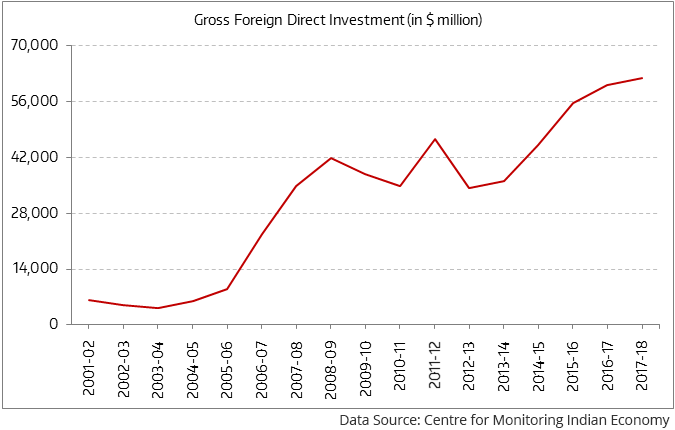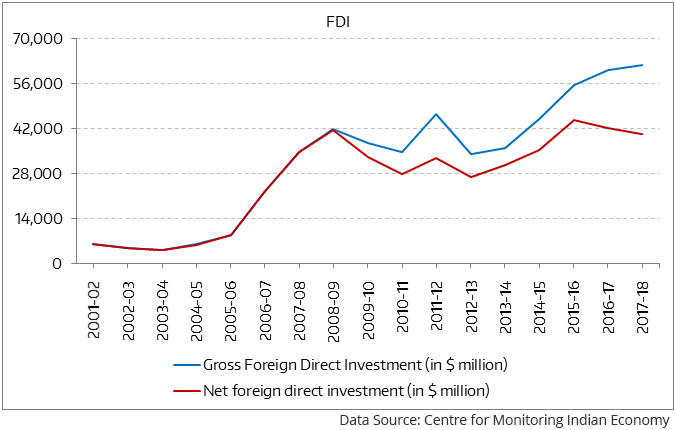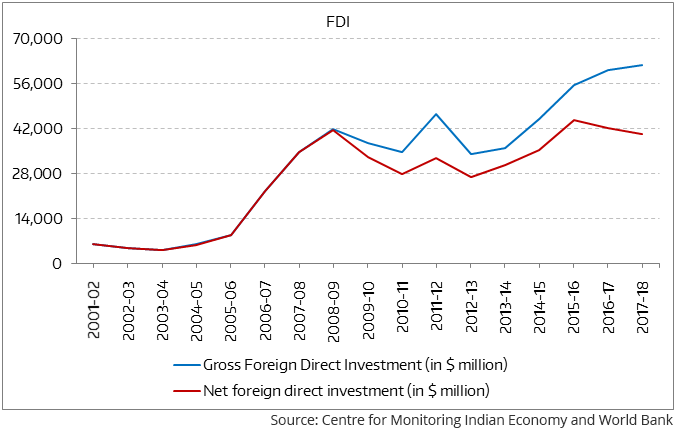
The Real Truth About India's FDI, Beyond WhatsApp

One the so-called successes of the Modi government has been on the foreign direct investment (FDI) front, i.e. if you are the kind who believes every WhatsApp forward that is sent your way. We have been told, over and over again, that the nation hasn't seen the kind of FDI it has seen in the last four years, ever before.
In fact, Amitabh Kant, the CEO of NITI Aayog, recently said on Twitter that the foreign direct investment in 2017-2018 was 85% higher than that in 2013-2014. Let's plot the FDI since 2001-2002 in Figure 1.
Figure 1:

Figure 1 is basically based on the FDI data compiled by the Reserve Bank of India (RBI) and has a clear upward trend. Doesn't that basically mean that the nation has never seen the kind of FDI that it has seen in the last four years? Let's try answering that question.
In 2017-2018, the gross FDI stood at $61.96 billion. In 2013-2014, the FDI was at $36.05 billion. Hence, FDI in 2017-2018 was 71.9% higher and not 85% higher as Kant claimed. But let's not nitpick here. Everyone makes silly calculation mistakes.
Dear Reader, as you would have noticed, Figure 1 plots what is referred to as Gross FDI data. This is the data that Amitabh Kant had talked about in his tweet (of course, he didn't refer to it as gross FDI data but simply FDI data).
While foreign entities can invest in India and buy companies and set up factories, they can also repatriate the money they had invested in India, and which has since grown, at any point of time. Once we subtract this amount from gross FDI what remains is net FDI, and which is the real FDI and not the number that Kant was talking about. I mean we have to adjust for the money that the foreigners are taking out of India.
Let's use an analogy here. Foreign investors invest in Indian stocks and bonds. They can also sell out at any point of time and repatriate their money. The net sales number is basically the difference between their buying and their selling, and not just what they are buying at any point of time. Along similar lines, the gross FDI number also needs to be adjusted for the repatriations that are made.
Let's take a look at Figure 2, which basically plots both gross and net FDIs.
Figure 2:

As can be seen from Figure 2, it is only in the last ten years that the net FDI number has started to diverge from the gross FDI number. In fact, while the gross FDI has risen between 2015-2016 and 2017-2018, the net FDI has fallen in the same period.
Take the case of 2017-2018, the gross FDI stood at $61.96 billion. The repatriations were at $21.51 billion. This meant that the net FDI stood at $40.44 billion. This was lower than the net FDIs in 2016-2017 and 2015-2016, at $42.21 billion and $44.90 billion, respectively. In fact, it was lower than the net FDI even in 2008-2009, which was at $41.73 billion.
Of course, FDI in 2017-2018 is higher than in 2011-2012. But that is if we don't adjust for the fact that the Indian gross domestic product (i.e. the Indian economy), has also grown during the period. And that needs to be adjusted for. As the economy grows, theoretically there should be more opportunities for foreign investors to invest in India.
How do things look when we calculate the FDI to GDP ratio? Let's take a look at Figure 3.
Figure 3:

What does Figure 3 tell us? It tells us that the FDI to GDP ratio was significantly better in most of the Manmohan Singh years, than it is now. In fact, in 2017-2018, the ratio came in at 1.6% of the GDP, which isn't much different from 1.5% in 2012-2013, when the Singh government was going through its worst period. Also, at 1.6% of the GDP, the FDI to GDP ratio is the lowest in five years. It is also the second lowest since 2006-2007.
The larger point here being that the world turns out to be a very different place, the moment you go beyond what the WhatsApp forwards say.
Further, economic variables in absolute terms grow year on year, more often than not. That is a given. But what we need to see is their size, with respect to the overall economy. This is something which the Modi government seems to miss out on, in most of its communication. Indeed, this attempt to deliberately mislead is very sad.
Regards,

Vivek Kaul
Editor, Vivek Kaul's Diary
PS: For someone who sifts stocks through multiple filters before cherry-picking the absolute best for his subscribers, follow Ankit Shah, the Equitymaster Insider, by subscribing here.
Vivek Kaul is the Editor of the Diary. He is the author of the Easy Money trilogy. The books were bestsellers on Amazon. His latest book is India's Big Government - The Intrusive State and How It is Hurting Us.
Disclaimer: The views mentioned above are of the author only. Data and charts, if used, in the article have been sourced from available information and have not been authenticated by any statutory authority. The author and Equitymaster do not claim it to be accurate nor accept any responsibility for the same. The views constitute only the opinions and do not constitute any guidelines or recommendation on any course of action to be followed by the reader. Please read the detailed Terms of Use of the web site.Recent Articles
- The Great Leader Has Won the Cow-Teller Award and Now Wants a Case Study January 17, 2019
- This is a spoof.
- Mohammed "Munna" Aziz and the Summer of 1989 November 28, 2018
- Vivek reminisces a nearly three decade-old summer, spent listening to a Hindi film song.
- I'm Looking for Companies Not Influenced by Farm Loan Waivers and Minimum Support Prices November 16, 2018
- Are there any good companies in the agrochemical space worth looking at?
- Should You Abandon Your Investment Strategy in This Falling Market? November 2, 2018
- It is in these volatile times, when investors' mettle is tested the most...
Equitymaster requests your view! Post a comment on "The Real Truth About India's FDI, Beyond WhatsApp". Click here!
6 Responses to "The Real Truth About India's FDI, Beyond WhatsApp"
Manmohan Khetan
Jul 9, 2018I feel Vivek is trying to put & analyse numbers objectively. Lets not align economic numbers & ground reality with political party. Raw numbers & their analysis are mere factual numbers.
Good job indeed by Vivek
Niranjan
Jul 7, 2018Thanks for showing how to use numbers and ratios to your benefit. What does FDI divided by GDP mean ? I don't think FDI/GDP is the way to measure the increased opportunities in a larger economy. We can choose other ratios too, like, say, the Net FDI divided by Population (FDI per capita) or even the Dollar-Rupee conversion ratio or any other factor that increases over time in the denominator to show that the Manmohan Singh years were better! Well, if we still go by your reasoning, it would mean that the increase in GDP is caused by domestic investment and not foreign investment, but then, you would't want to admit that right, my dear author ? In any case, I am happy that you are believing in the GPD numbers.
"Indeed, this attempt to deliberately mislead is very sad."
Prasad
Jul 7, 2018It can also mean that India's GDP is less dependent on FDI. Money leaving India has more to do with Fed lift-off. Of course to some extent, banking scams could also be responsible.
Vikram Bhatt
Jul 4, 2018Respected Sir,
Begin and end of your article proves that this is more political (or only political?)then financial.
In last few months politics is more focused in your articles.
I am your admir and therefore request you not get into political part because I do not recall your articles making political statements before. Why now?
By the way would situation been same, better or worse if earlier government was still in power?
Regards
Vikram Bhatt


Vivek Mathur
Jul 24, 2018Why is the overwhelming majority of FDI into India coming from tax havens? Legitimate FDI does not need to hide its origins. There is certainly a case to be made that the vast majority of FDI is roundtripping of tax-evading profits from Indian exports, which themselves could be vehicles for sheltering tax avoidance of domestic businesses. But this seems to be- if you'll pardon the expression- an untouchable holy cow of an issue.